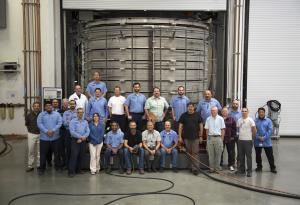First central solenoid module ready for heat treatment
20 Feb 2017
In a major milestone, the US contractor responsible for the fabrication of the ITER central solenoid has successfully joined seven individual coil sections, or more than 6 kilometres of niobium-tin superconductor. Now, the module core will spend one month in heat treatment at temperatures of up to 650 °C.
Something to celebrate: at the General Atomic Magnet Development Facility outside of San Diego, California, engineers and technicians have successfully completed the joining of the seven individual sections of the first central solenoid module.
At the General Atomic Magnet Development Facility outside of San Diego, California, the ITER central solenoid team has something to celebrate. After spending months carefully winding the seven individual sections of the first central solenoid module, composed of over 100 tonnes of cable-in-conduit conductor, engineers and technicians have successfully completed the joining of the sections.
That makes the module ready for the next step—heat treatment—a month-long process during which the niobium-tin alloy becomes superconducting. The component will be placed in a furnace at temperatures of up to 650 °C, with constant temperature hold time exceeding 350 hours.
While the first module is in the heat treatment furnace, the team will begin work on joining the conductor sections of the second module. The central solenoid magnets is formed from six individual coil modules stacked vertically within a "cage" of supporting structures; General Atomics is also producing a seventh module as a spare.


